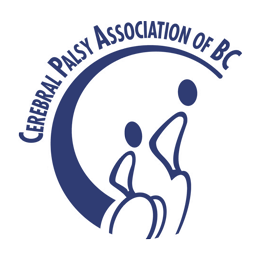STEPtember is a global initiative that runs from Sept 4th to Oct 1st, supporting cerebral palsy associations across the world through fitness. Participants are challenged to take 10,000 steps a day while at the same time, collecting donations from friends and family who support their hard work.
Four weeks in, we’ve teamed up with 216 participants and raised $25,463.70!
Thanks to all of organizations, teams and individuals involved, we’re truly making a difference in the disability community in BC.
Meet Meg and Nash Croken
Meg Croken has truly been one of our bigg est difference makers during this STEPtember campaign. We were incredibly lucky to have her join the team this year and what an incredible job she’s done.
est difference makers during this STEPtember campaign. We were incredibly lucky to have her join the team this year and what an incredible job she’s done.
Meg’s team, the Croken Clan, have been making waves as our top independent fundraiser. To date, the generous group of family and friends has raised $3,660.00 to support our organization.
The one who inspires the Croken Clan to make a difference is four-month-old Nash, Meg’s son, who is suspected to be diagnosed with cerebral palsy. His arrival signalled a new perspective for each and every one of their team members. Now, the group wants to do what they can for Nash and others with cerebral palsy: to create a community that’s inclusive and accessible for all.
Along with her tremendous fundraising effort, she’s taking it a step further by raising awareness about cerebral palsy and telling her personal story to her community in Salmon Arm. Fearless!
Here’s how our conversation went:
WC: What does STEPtember mean to you and what made you want to get involved with CPABC?
MC: To me, STEPtember is a fun and positive way to help support people with cerebral palsy. My son Nash has recently been diagnosed with cerebral palsy and as we have been doing research about different therapy and cerebral palsy in general I realized how little I, and those around me, actually know about cerebral palsy. As a parent, I want to help my children as much as I am able and I believe one of the most important things that I can do to help Nash on his journey with cerebral palsy is to educate people as much as possible on what cerebral palsy is, and what it isn’t; and help remove the social barriers associated with disabilities. STEPtember is a great way to accomplish these goals.
WC: STEPtember gives us an opportunity to show all the different ways you can get active and make a difference in the disability community at the same time. What are you planning to do to be active in the month of September?
MC: The majority of my 10000 daily steps is accomplished simply through daily life, with chasing after my toddler and 4 month old. However, I also take the boys for a walk everyday and try to rotate between yoga and an aerobic or weight training exercise routine.
WC: What inspires you to help the disability community in BC?
MC: When the pediatrician suspected that my younger son had cerebral palsy, I immediately started looking at the world around me through different eyes. When parking I would find myself thinking: ‘all the handicapped stalls are taken, if we had to have Nash in a wheelchair how would I find a spot with space to get him in and out of the car?’ When coming across stairs without a railing, ‘Would Nash need to take the long way around to find a ramp because the stairs don’t have the necessary support?’ Over and over I have noticed places that are technically accessible but have chairs or other furniture blocking the way that would need to be moved to make room for a wheelchair or walker; or perhaps there is a ramp but it is in the rear of the building and require you to buzz and wait for someone to come and open the back door; or the doors are supposed to automatically open but the button is broken. I want to become an advocate to create spaces that are truly accessible and do not require additional assistance; where no one has to ask for a chair to be moved to make room for them to go by or wait at the delivery entrance to enter a building. I want to see a community where no one has to hesitate to go out around the town or be brave enough to ask for assistance but to be confident knowing they can go anywhere they wish without encountering obstacles. I want to empower other people to see and remove the obstacles that surround the disabled community.
WC: You mentioned that your four-month-old son, Nash, was recently diagnosed with cerebral palsy. What kind of impact has Nash had on your friends and family?
MC: Since receiving Nash’s diagnosis my friends and family have joined me in learning as much as possible about cerebral palsy and the disabled community in general – specifically in regards to social aspects (What are proper terms to use or avoid, conversation starters, education tools and so on).
WC: Has raising Nash thus far influenced the way you perceive the word and idea of “disability”?
MC: The word ‘disability’ is one that I struggle with. Before I have never thought much of it, but now I find it such an inadequate word. As a whole, I find the lingo used to refer to disabilities to have a very strong negative connotation as well as being incredibly vague and outdated. I find the focus is on the ‘dis’ not the ability, the ‘need’ not the special, and when I look at my beautiful boy I don’t want any of these labels placed on him.
WC: What advice do you give to someone who is trying to be active, especially parents of children with disabilities?
MC: My advice for people trying to be active is to make it a priority. Exercise is huge for both physical and mental health. Before you get in the car, question whether you can walk to your destination instead. Create a habit of a ‘wind down’ with your spouse or family where you catch each other up on your days, explore new activities and discover new hobbies.
WC: What would you say to someone wants to start fundraising for a good cause but is on the edge of deciding to do so?
MC: Go for it! There is no use waiting for a less busy time of life. Life is always busy we need to make time for the things that are important to us and make time to help others. Don’t be afraid to ask for donations, the worst that can happen is the person says no and you are no worse off than when you started!
One thing I would love to see change for the disabled community is proper education on socializing. Instead of teaching kids not to stare, teach them to go up and introduce themselves and find some common ground to build a new friendship.
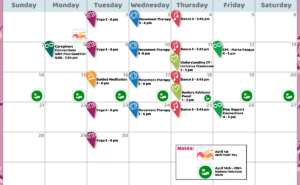 Programs Calendar
Programs Calendar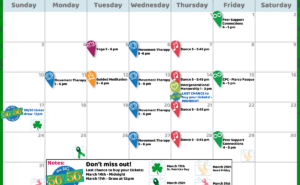 Programs Calendar
Programs Calendar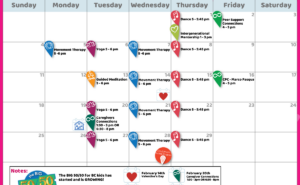 Programs Calendar
Programs Calendar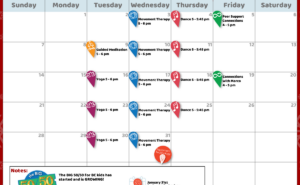 Programs Calendar
Programs Calendar

